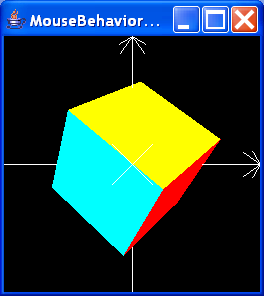MouseBehaviorApp renders a single, interactively rotatable,translatable, and zoomable ColorCube object

/*
* @(#)MouseBehaviorApp.java 1.0 99/03/25 11:42:40
*
* Copyright (c) 1996-1999 Sun Microsystems, Inc. All Rights Reserved.
*
* Sun grants you ("Licensee") a non-exclusive, royalty free, license to use,
* modify and redistribute this software in source and binary code form,
* provided that i) this copyright notice and license appear on all copies of
* the software; and ii) Licensee does not utilize the software in a manner
* which is disparaging to Sun.
*
* This software is provided "AS IS," without a warranty of any kind. ALL
* EXPRESS OR IMPLIED CONDITIONS, REPRESENTATIONS AND WARRANTIES, INCLUDING ANY
* IMPLIED WARRANTY OF MERCHANTABILITY, FITNESS FOR A PARTICULAR PURPOSE OR
* NON-INFRINGEMENT, ARE HEREBY EXCLUDED. SUN AND ITS LICENSORS SHALL NOT BE
* LIABLE FOR ANY DAMAGES SUFFERED BY LICENSEE AS A RESULT OF USING, MODIFYING
* OR DISTRIBUTING THE SOFTWARE OR ITS DERIVATIVES. IN NO EVENT WILL SUN OR ITS
* LICENSORS BE LIABLE FOR ANY LOST REVENUE, PROFIT OR DATA, OR FOR DIRECT,
* INDIRECT, SPECIAL, CONSEQUENTIAL, INCIDENTAL OR PUNITIVE DAMAGES, HOWEVER
* CAUSED AND REGARDLESS OF THE THEORY OF LIABILITY, ARISING OUT OF THE USE OF
* OR INABILITY TO USE SOFTWARE, EVEN IF SUN HAS BEEN ADVISED OF THE
* POSSIBILITY OF SUCH DAMAGES.
*
* This software is not designed or intended for use in on-line control of
* aircraft, air traffic, aircraft navigation or aircraft communications; or in
* the design, construction, operation or maintenance of any nuclear
* facility. Licensee represents and warrants that it will not use or
* redistribute the Software for such purposes.
*/
import java.applet.Applet;
import java.awt.BorderLayout;
import java.awt.Frame;
import com.sun.j3d.utils.applet.MainFrame;
import com.sun.j3d.utils.geometry.ColorCube;
import com.sun.j3d.utils.universe.*;
import com.sun.j3d.utils.behaviors.mouse.*;
import javax.media.j3d.*;
import javax.vecmath.*;
import java.awt.event.*;
import java.util.Enumeration;
// MouseBehaviorApp renders a single, interactively rotatable,
// traslatable, and zoomable ColorCube object.
public class MouseBehaviorApp extends Applet {
public BranchGroup createSceneGraph() {
// Create the root of the branch graph
BranchGroup objRoot = new BranchGroup();
TransformGroup objTransform = new TransformGroup();
objTransform.setCapability(TransformGroup.ALLOW_TRANSFORM_WRITE);
objTransform.setCapability(TransformGroup.ALLOW_TRANSFORM_READ);
objRoot.addChild(objTransform);
objTransform.addChild(new ColorCube(0.4));
objRoot.addChild(new Axis());
MouseRotate myMouseRotate = new MouseRotate();
myMouseRotate.setTransformGroup(objTransform);
myMouseRotate.setSchedulingBounds(new BoundingSphere());
objRoot.addChild(myMouseRotate);
MouseTranslate myMouseTranslate = new MouseTranslate();
myMouseTranslate.setTransformGroup(objTransform);
myMouseTranslate.setSchedulingBounds(new BoundingSphere());
objRoot.addChild(myMouseTranslate);
MouseZoom myMouseZoom = new MouseZoom();
myMouseZoom.setTransformGroup(objTransform);
myMouseZoom.setSchedulingBounds(new BoundingSphere());
objRoot.addChild(myMouseZoom);
// Let Java 3D perform optimizations on this scene graph.
objRoot.compile();
return objRoot;
} // end of CreateSceneGraph method of MouseBehaviorApp
// Create a simple scene and attach it to the virtual universe
public MouseBehaviorApp() {
setLayout(new BorderLayout());
Canvas3D canvas3D = new Canvas3D(null);
add("Center", canvas3D);
BranchGroup scene = createSceneGraph();
// SimpleUniverse is a Convenience Utility class
SimpleUniverse simpleU = new SimpleUniverse(canvas3D);
// This will move the ViewPlatform back a bit so the
// objects in the scene can be viewed.
simpleU.getViewingPlatform().setNominalViewingTransform();
simpleU.addBranchGraph(scene);
} // end of MouseBehaviorApp (constructor)
// The following allows this to be run as an application
// as well as an applet
public static void main(String[] args) {
System.out.print("MouseBehaviorApp.java \n- a demonstration of using the mouse ");
System.out.println("behavior utility classes to provide interaction in a Java 3D scene.");
System.out.println("Hold the mouse button while moving the mouse to make the cube move.");
System.out.println(" left mouse button - rotate cube");
System.out.println(" right mouse button - translate cube");
System.out.println(" Alt+left mouse button - zoom cube");
System.out.println("This is a simple example progam from The Java 3D API Tutorial.");
System.out.println("The Java 3D Tutorial is available on the web at:");
System.out.println("http://www.sun.com/desktop/java3d/collateral");
Frame frame = new MainFrame(new MouseBehaviorApp(), 256, 256);
} // end of main (method of MouseBehaviorApp)
} // end of class MouseBehaviorApp
/*
* Getting Started with the Java 3D API written in Java 3D
*
* This program demonstrates: 1. writing a visual object class In this program,
* Axis class defines a visual object This particular class extends Shape3D See
* the text for a discussion. 2. Using LineArray to draw 3D lines.
*/
class Axis extends Shape3D {
////////////////////////////////////////////
//
// create axis visual object
//
public Axis() {
this.setGeometry(createGeometry());
}
private Geometry createGeometry() {
// create line for X axis
IndexedLineArray axisLines = new IndexedLineArray(18,
GeometryArray.COORDINATES, 30);
axisLines.setCoordinate(0, new Point3f(-1.0f, 0.0f, 0.0f));
axisLines.setCoordinate(1, new Point3f(1.0f, 0.0f, 0.0f));
axisLines.setCoordinate(2, new Point3f(0.9f, 0.1f, 0.1f));
axisLines.setCoordinate(3, new Point3f(0.9f, -0.1f, 0.1f));
axisLines.setCoordinate(4, new Point3f(0.9f, 0.1f, -0.1f));
axisLines.setCoordinate(5, new Point3f(0.9f, -0.1f, -0.1f));
axisLines.setCoordinate(6, new Point3f(0.0f, -1.0f, 0.0f));
axisLines.setCoordinate(7, new Point3f(0.0f, 1.0f, 0.0f));
axisLines.setCoordinate(8, new Point3f(0.1f, 0.9f, 0.1f));
axisLines.setCoordinate(9, new Point3f(-0.1f, 0.9f, 0.1f));
axisLines.setCoordinate(10, new Point3f(0.1f, 0.9f, -0.1f));
axisLines.setCoordinate(11, new Point3f(-0.1f, 0.9f, -0.1f));
axisLines.setCoordinate(12, new Point3f(0.0f, 0.0f, -1.0f));
axisLines.setCoordinate(13, new Point3f(0.0f, 0.0f, 1.0f));
axisLines.setCoordinate(14, new Point3f(0.1f, 0.1f, 0.9f));
axisLines.setCoordinate(15, new Point3f(-0.1f, 0.1f, 0.9f));
axisLines.setCoordinate(16, new Point3f(0.1f, -0.1f, 0.9f));
axisLines.setCoordinate(17, new Point3f(-0.1f, -0.1f, 0.9f));
axisLines.setCoordinateIndex(0, 0);
axisLines.setCoordinateIndex(1, 1);
axisLines.setCoordinateIndex(2, 2);
axisLines.setCoordinateIndex(3, 1);
axisLines.setCoordinateIndex(4, 3);
axisLines.setCoordinateIndex(5, 1);
axisLines.setCoordinateIndex(6, 4);
axisLines.setCoordinateIndex(7, 1);
axisLines.setCoordinateIndex(8, 5);
axisLines.setCoordinateIndex(9, 1);
axisLines.setCoordinateIndex(10, 6);
axisLines.setCoordinateIndex(11, 7);
axisLines.setCoordinateIndex(12, 8);
axisLines.setCoordinateIndex(13, 7);
axisLines.setCoordinateIndex(14, 9);
axisLines.setCoordinateIndex(15, 7);
axisLines.setCoordinateIndex(16, 10);
axisLines.setCoordinateIndex(17, 7);
axisLines.setCoordinateIndex(18, 11);
axisLines.setCoordinateIndex(19, 7);
axisLines.setCoordinateIndex(20, 12);
axisLines.setCoordinateIndex(21, 13);
axisLines.setCoordinateIndex(22, 14);
axisLines.setCoordinateIndex(23, 13);
axisLines.setCoordinateIndex(24, 15);
axisLines.setCoordinateIndex(25, 13);
axisLines.setCoordinateIndex(26, 16);
axisLines.setCoordinateIndex(27, 13);
axisLines.setCoordinateIndex(28, 17);
axisLines.setCoordinateIndex(29, 13);
return axisLines;
} // end of Axis createGeometry()
} // end of class Axis
Related examples in the same category